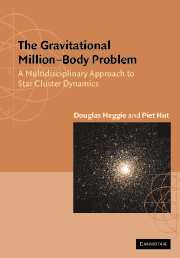Book contents
- Frontmatter
- Contents
- Preface
- PART I INTRODUCTIONS
- PART II THE CONTINUUM LIMIT: N → ∞
- PART III MEAN FIELD DYNAMICS: N = 106
- PART IV MICROPHYSICS: N = 2
- PART V GRAVOTHERMODYNAMICS: N = 106
- PART VI GRAVITATIONAL SCATTERING: N = 3
- 19 Thought Experiments
- 20 Mathematical Three-Body Scattering
- 21 Analytical Approximations
- 22 Laboratory Experiments
- 23 Gravitational Burning and Transmutation
- PART VII PRIMORDIAL BINARIES: N = 4
- PART VIII POST-COLLAPSE EVOLUTION: N = 106
- PART IX STAR CLUSTER ECOLOGY
- Appendix A A Simple N-Body Integrator
- Appendix B Hints to Solution of Problems
- References
- Index
19 - Thought Experiments
Published online by Cambridge University Press: 05 June 2012
- Frontmatter
- Contents
- Preface
- PART I INTRODUCTIONS
- PART II THE CONTINUUM LIMIT: N → ∞
- PART III MEAN FIELD DYNAMICS: N = 106
- PART IV MICROPHYSICS: N = 2
- PART V GRAVOTHERMODYNAMICS: N = 106
- PART VI GRAVITATIONAL SCATTERING: N = 3
- 19 Thought Experiments
- 20 Mathematical Three-Body Scattering
- 21 Analytical Approximations
- 22 Laboratory Experiments
- 23 Gravitational Burning and Transmutation
- PART VII PRIMORDIAL BINARIES: N = 4
- PART VIII POST-COLLAPSE EVOLUTION: N = 106
- PART IX STAR CLUSTER ECOLOGY
- Appendix A A Simple N-Body Integrator
- Appendix B Hints to Solution of Problems
- References
- Index
Summary
As has been seen in Chapter 18, two-body relaxation predicts its own downfall. It leads to the collapse of the core and, at the level of simplified models, infinite central density. Clearly, some new dynamical processes, beyond two-body encounters, must come into play. The very high density is the clue, for it suggests that a third body may, with increasing probability, intervene in the two-body encounters which mediate relaxation. In Chapter 27 it will be seen that three-body encounters do indeed act on a sufficiently short time scale, late in core collapse, to have a decisive influence on events. As we note there, this is not the only mechanism that can work, but we concentrate on it for the time being.
The mechanism is a two-stage one, both stages involving three-body encounters. In the first stage, which we consider in Chapter 21, a three-body interaction leads to the formation of a binary star and a single third body (which acts as a kind of catalyst). In the second stage, this binary interacts with other single stars (again in three-body reactions). In this chapter we shall study three-body encounters in isolation, in order to uncover those properties which allow them to play their crucial role in rescuing the cluster from collapse. Clusters get into this difficulty because of their negative heat capacity, and in fact it is the negative heat capacity of binaries which comes to their rescue.
- Type
- Chapter
- Information
- The Gravitational Million–Body ProblemA Multidisciplinary Approach to Star Cluster Dynamics, pp. 181 - 188Publisher: Cambridge University PressPrint publication year: 2003



